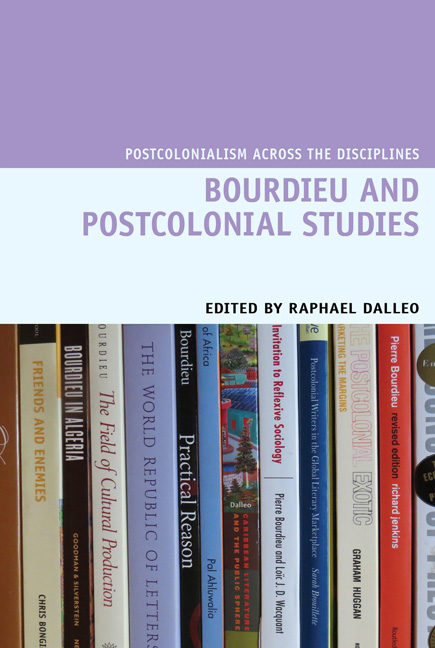Book contents
- Frontmatter
- Contents
- Permissions
- Introduction
- 1 Writing at the Margins: Postcolonialism, Exoticism and the Politics of Cultural Value (from The Postcolonial Exotic)
- 2 Exiles on Main Stream: Valuing the Popularity of Postcolonial Literature (from Friends and Enemies)
- 3 Postcolonial Authorship Revisited (from Postcolonial Writers in the Global Literary Marketplace)
- 4 Bourdieu and Fanon on Algeria
- 5 Style as Habitus: World Literature, Decolonization and Caribbean Voices
- 6 Playing the Game? The Publication of Oswald Mtshali
- 7 Fields in Formation: English Studies and National Literature in South Africa (with a Brazilian Comparison)
- 8 Archived Relationships: Pierre Bourdieu and Writers of the Caribbean Diaspora
- 9 Irony in the Dungeon: Anamnesis and Emancipation
- About the Contributors
- Index
8 - Archived Relationships: Pierre Bourdieu and Writers of the Caribbean Diaspora
- Frontmatter
- Contents
- Permissions
- Introduction
- 1 Writing at the Margins: Postcolonialism, Exoticism and the Politics of Cultural Value (from The Postcolonial Exotic)
- 2 Exiles on Main Stream: Valuing the Popularity of Postcolonial Literature (from Friends and Enemies)
- 3 Postcolonial Authorship Revisited (from Postcolonial Writers in the Global Literary Marketplace)
- 4 Bourdieu and Fanon on Algeria
- 5 Style as Habitus: World Literature, Decolonization and Caribbean Voices
- 6 Playing the Game? The Publication of Oswald Mtshali
- 7 Fields in Formation: English Studies and National Literature in South Africa (with a Brazilian Comparison)
- 8 Archived Relationships: Pierre Bourdieu and Writers of the Caribbean Diaspora
- 9 Irony in the Dungeon: Anamnesis and Emancipation
- About the Contributors
- Index
Summary
In ‘The Man,’ a short story included in Austin Clarke's collection When Women Rule (1985), William Jefferson, a Barbadian immigrant living in Toronto, hopes to sell his private correspondence to a university. He composes letters ‘to the leaders of the world, in the hope of getting back a reply […] which he intended to sell to the highest bidder’ (96). This short story introduces my investigation of the archived, unpublished correspondence between Clarke and Samuel Selvon, two writers of the Caribbean diaspora. Selvon, who was born in Trinidad in 1923, immigrated to London in 1950 and to Calgary in 1978. Clarke, who was born in Barbados in 1934, immigrated to Toronto in 1955 and still resides there. Their correspondence began shortly after their first meeting in 1965 and lasted until a few years before Selvon's death in 1994, and many of these letters—those Clarke wrote and received—are accessible via the Austin Clarke fonds at McMaster University. I argue that a Bourdieusian methodology, which takes into account the power relations within which archived documents operate, productively serves the study of the private and public relationships maintained by Caribbean immigrant writers as exposed through archival research. My attention to these relationships will demonstrate that the categorizations used to organize authors within the Caribbean diaspora have descriptive powers that should not overshadow their simulated nature. Categorizations that depend on a white/black racial binary, on the assignation of writers to specific nationalities despite their possession of multiple citizenships or on narratives of exile often involve arranging Caribbean immigrant writers’ subjectivities in ways that ignore the complexities of their dispositions and their transnational positionings. I model a more reflective consideration of the social, commercial and epistemological relationships that define the transnational networks traversed by these writers in order to disrupt such schemas.
Clarke's composition of ‘The Man’ demonstrates his awareness of the implicit and explicit functions of archives. Jefferson, the protagonist, subscribes to a belief in value as determined by the interests of dominant social agents. His attempts to form relationships with consecrated individuals are motivated both by the possibility of financial reward and the need to be recognized. However, his choice to invest in what seems to be his only opportunity to be recognized privileges contrivance over genuine self-expression and therefore comes at the price of misrecognition.
- Type
- Chapter
- Information
- Bourdieu and Postcolonial Studies , pp. 175 - 190Publisher: Liverpool University PressPrint publication year: 2016



